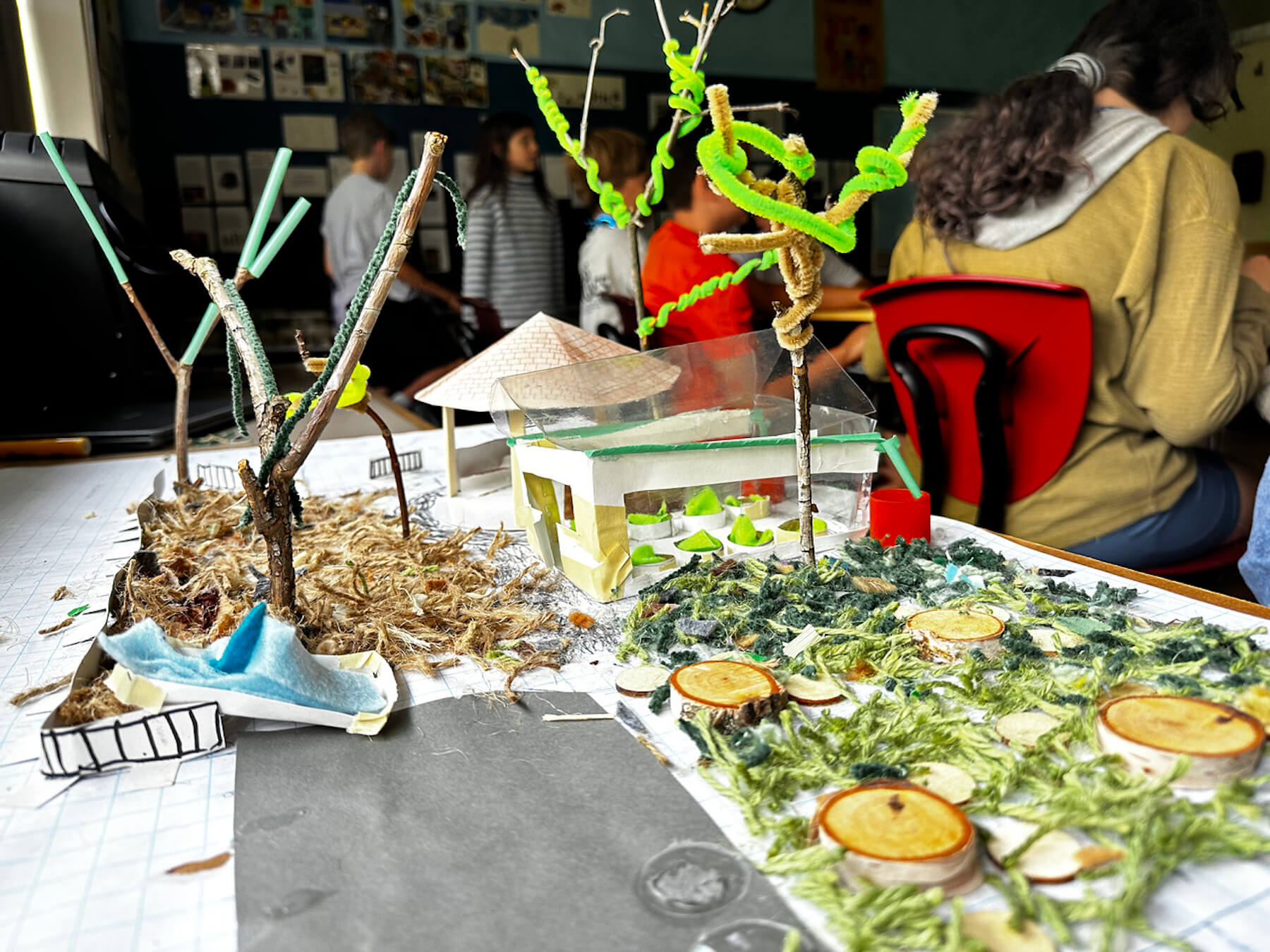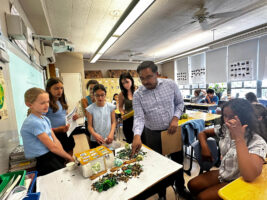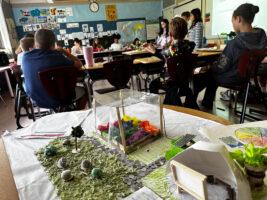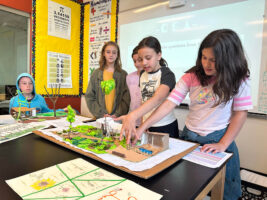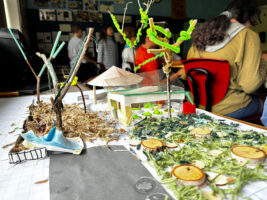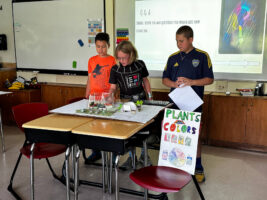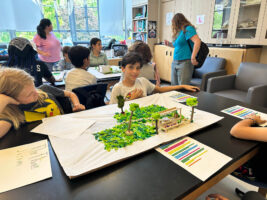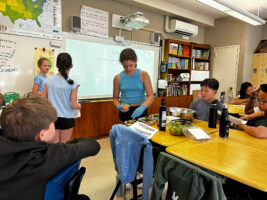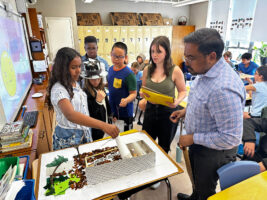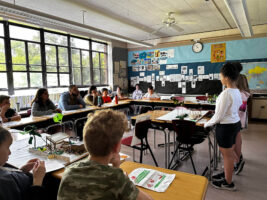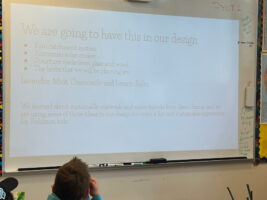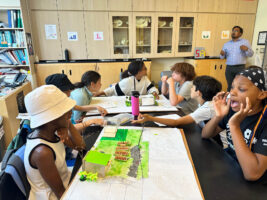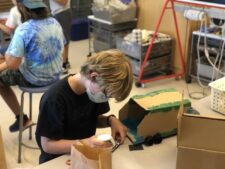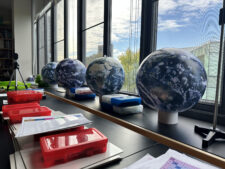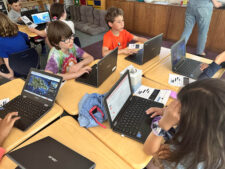As the academic year neared its end, students at the Ethical Culture Fieldston School were busy preparing for assessments, cherishing moments together before bidding farewell for the summer, and wrapping up final projects. Among them, the 5th Graders at Fieldston Lower were particularly occupied with their upcoming “Shark Tank” presentations.
Inspired by the popular entrepreneurial TV show, this beloved project combines elements of design, research, persuasive writing, public speaking, and practical thinking. Not to mention, it serves as the culmination of a year-long exploration of ethics centered around the question: “What strategies do people use to create change?”
As in years past, students were tasked with developing an idea that would benefit our planet in the wake of the climate crisis. However, this year, the project had an exciting twist! Instead of creating a business model for a product, students would design an outdoor learning space in the Fieldston Lower garden.

“We were excited to move away from a consumer product-oriented project toward a more tangible, grounded design goal that connected students to their immediate environment and community,” explained 5th Grade Teacher Dani Cardia.
In preparation for their project, the 5th Graders at Fieldston Lower delved into thorough research on various plant species. Their objective was to determine the most suitable use for the garden plantings, exploring options such as growing food, cultivating plants for natural dyes, providing support for pollinators, or creating a sensory garden.
While making their decisions, sustainability and environmentally friendly practices played a crucial role in their thought process. The students recognized the importance of incorporating practices such as gray water usage, rain catchment systems, and renewable energy sources to minimize their environmental impact. Each group carefully considered the benefits and implications of their chosen direction and demonstrated that they understood the significance of conserving resources and sought to implement these practices in the garden project.
Another critical aspect of their undertaking was ensuring accessibility. The groups brainstormed ideas and solutions to make the garden space inclusive for all visitors of the Fieldston Lower Garden. They considered existing pathways, raised beds, and determined if modifications were needed to ensure that people with diverse physical abilities could actively engage in the garden experience.
Furthermore, the students went a step further and crafted a comprehensive lesson plan outlining how Fieldston Lower students could effectively utilize the garden space. They devised activities and educational opportunities that aligned with different subjects and grade levels. The lesson plan aimed to maximize the garden’s potential as an interactive learning environment, fostering curiosity, hands-on exploration, and a deeper understanding of nature and sustainability.
Through their research, planning, and consideration of sustainability, accessibility, and educational value, the 5th Graders at Fieldston Lower were poised to present an innovative and impactful vision for the garden project, showcasing their commitment to creating positive change and nurturing a greener future.
And that’s exactly what they did! When it was time for their presentations, the 5th Graders brilliantly showcased their comprehensive research and diligent efforts. As the “sharks” — Assistant Principal of Academic Life Shawn Chisty, Fieldston Lower Principal Joe McCauley, Diversity, Equity, and Inclusion Lead Tim Garcia, and even members of the Fieldston Upper Environmental Club Aviva S. ’24, Julia K. ’24, and Gabriela N. ’24 — curiously listened in, students described ideas that included growing native plants that are both edible and can be used to create natural paints, reestablishing a marsh that used to exist in the garden space, adding a bathroom with a compostable toilet, using slanted roofs for their outdoor classrooms that would serve as a rain catchment system, and introducing a ramp that will make the space more accessible.
In addition to imagining the outdoor classrooms, the students designed lesson plans that were equally innovative. They conceptualized lessons where students could learn how to make natural teas from plants and partake in cooking classes from vegetables grown in the garden. One group even suggested adding a duck sanctuary that 1st Graders could use for their bird study!

“I was really impressed by how my students went above and beyond — incorporating foods like salad, making jam, and handcrafting miniature vegetables,” said 5th Grade Teacher Rebecca Butler.
“The students took their presentations very seriously,” added Cardia. “These groups faced a number of challenges in collaborating over so many weeks of work, and in the end, they presented their designs so creatively and professionally.”
The students’ ideas were varied, creative, and, quite frankly, very practical! At the end of the presentations, McCauley applauded the students for their hard work and explained how incredibly impressed he was by each of their projects — adding that he would closely consider each of the plans to see how they could be implemented in the garden in the future!

